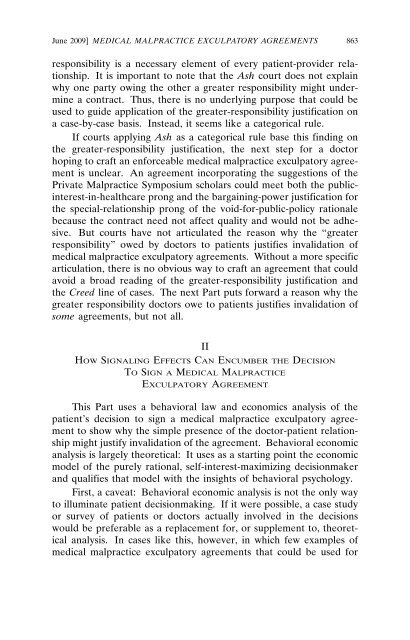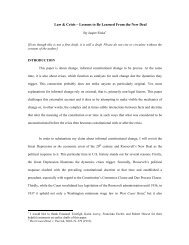In Search of an Enforceable Medical Malpractice Exculpatory
In Search of an Enforceable Medical Malpractice Exculpatory
In Search of an Enforceable Medical Malpractice Exculpatory
You also want an ePaper? Increase the reach of your titles
YUMPU automatically turns print PDFs into web optimized ePapers that Google loves.
June 2009] MEDICAL MALPRACTICE EXCULPATORY AGREEMENTS 863<br />
responsibility is a necessary element <strong>of</strong> every patient-provider relationship.<br />
It is import<strong>an</strong>t to note that the Ash court does not explain<br />
why one party owing the other a greater responsibility might undermine<br />
a contract. Thus, there is no underlying purpose that could be<br />
used to guide application <strong>of</strong> the greater-responsibility justification on<br />
a case-by-case basis. <strong>In</strong>stead, it seems like a categorical rule.<br />
If courts applying Ash as a categorical rule base this finding on<br />
the greater-responsibility justification, the next step for a doctor<br />
hoping to craft <strong>an</strong> enforceable medical malpractice exculpatory agreement<br />
is unclear. An agreement incorporating the suggestions <strong>of</strong> the<br />
Private <strong>Malpractice</strong> Symposium scholars could meet both the publicinterest-in-healthcare<br />
prong <strong>an</strong>d the bargaining-power justification for<br />
the special-relationship prong <strong>of</strong> the void-for-public-policy rationale<br />
because the contract need not affect quality <strong>an</strong>d would not be adhesive.<br />
But courts have not articulated the reason why the “greater<br />
responsibility” owed by doctors to patients justifies invalidation <strong>of</strong><br />
medical malpractice exculpatory agreements. Without a more specific<br />
articulation, there is no obvious way to craft <strong>an</strong> agreement that could<br />
avoid a broad reading <strong>of</strong> the greater-responsibility justification <strong>an</strong>d<br />
the Creed line <strong>of</strong> cases. The next Part puts forward a reason why the<br />
greater responsibility doctors owe to patients justifies invalidation <strong>of</strong><br />
some agreements, but not all.<br />
II<br />
HOW SIGNALING EFFECTS CAN ENCUMBER THE DECISION<br />
TO SIGN A MEDICAL MALPRACTICE<br />
EXCULPATORY AGREEMENT<br />
This Part uses a behavioral law <strong>an</strong>d economics <strong>an</strong>alysis <strong>of</strong> the<br />
patient’s decision to sign a medical malpractice exculpatory agreement<br />
to show why the simple presence <strong>of</strong> the doctor-patient relationship<br />
might justify invalidation <strong>of</strong> the agreement. Behavioral economic<br />
<strong>an</strong>alysis is largely theoretical: It uses as a starting point the economic<br />
model <strong>of</strong> the purely rational, self-interest-maximizing decisionmaker<br />
<strong>an</strong>d qualifies that model with the insights <strong>of</strong> behavioral psychology.<br />
First, a caveat: Behavioral economic <strong>an</strong>alysis is not the only way<br />
to illuminate patient decisionmaking. If it were possible, a case study<br />
or survey <strong>of</strong> patients or doctors actually involved in the decisions<br />
would be preferable as a replacement for, or supplement to, theoretical<br />
<strong>an</strong>alysis. <strong>In</strong> cases like this, however, in which few examples <strong>of</strong><br />
medical malpractice exculpatory agreements that could be used for
















